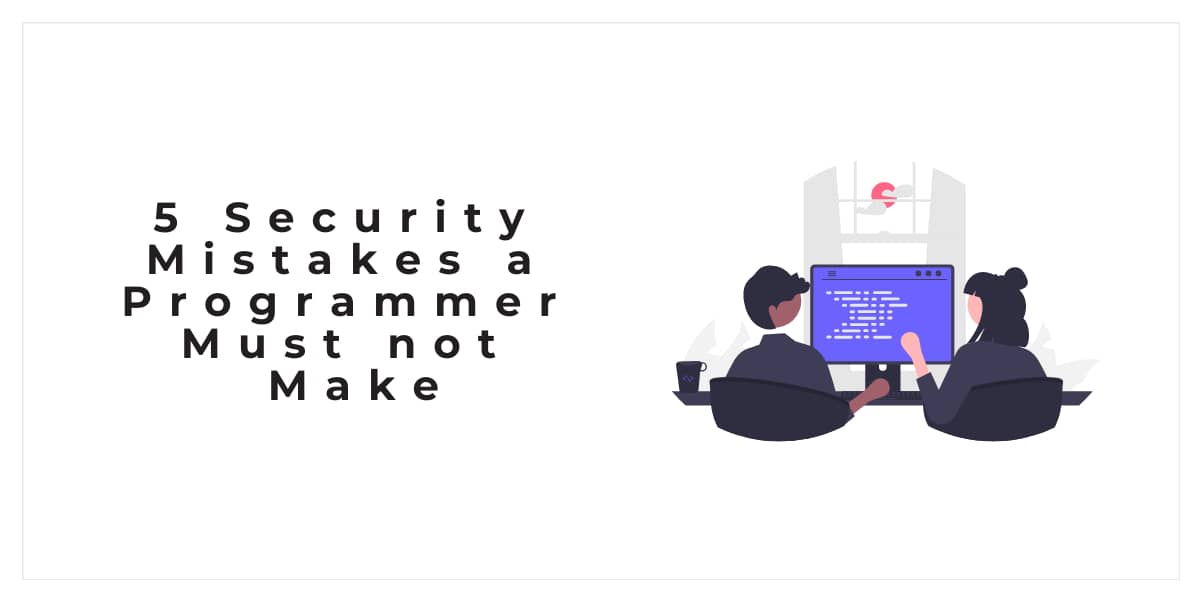Software development is a promising and popular career choice. In 2020, an average U.S. programmer made $89,190, and the salaries have steadily risen over the last decade. They continue to increase until now. HRs relentlessly hunt for senior software developers. Moreover, Forbes reported a significant lack of cybersecurity-oriented software developers.
It's safe to assume that cybersecurity developers will easily find lucrative job positions. The number of apps people use is growing. Simultaneously grows the need to secure them. Previously we have written about five steps you can take to secure your software. This article will focus on the top five most common security mistakes programmers make.
1. Security at the Last Step.
Many software developers didn't have to bother about cybersecurity. After all, if you're coding websites in JavaScript, you might not be an expert on hashing and encryption. With time, however, more and more programmers require at least some CySec knowledge. For example, the switch to HTTPS pushed front-enders into studying encryption.
Knowing about cybersecurity is one thing, but correctly implementing it is different. One of the most common mistakes is the last-step mentality that the code can be secured at the very end. On the contrary, cybersecurity is not an additional step but a mandatory addition to every step. It's essential to start securing the code from the very beginning. Develop a safety-oriented mindset and include cybersecurity tasks for each development cycle. At the end of each cycle, overview (or test if possible) whether the code is safe.
2. Third-Party Code Audits.
Very rarely do programmers need to write the whole application from scratch. Most often, they rely on third-party tools. For example, video game engines are frequently used to create virtual environments like the metaverse. Other times people turn to StackOverflow for important essential functions.
However, it's a critical error to import code without inspecting it. SQL injections - a highly sophisticated hacking method - rely on chunks of unsecured code. Each line of code you import might have vulnerabilities. Leaving them unpatched can have dire consequences. Like in the first step, develop a habit of doing a security audit for each third-party code you use.
3. Safe Password Management.
Application code is not the only attack trajectory. Password management has been an issue for quite some time. As the Colonial Pipeline attack illustrates, a weak password can cost $4.4 million.
There are two issues to pay close attention to. Firstly, programmers frequently hard code passwords for various purposes, such as authorization mechanism testing. Also, if you use a password to control access to specific application segments, you can leave yourself a comment in the code with a password reminder. Deleting these comments and hard-coded passwords is essential when deploying code to production. Anyone inspecting the code and stumbling upon a password could get admin-level access to cause serious trouble.
Second, developers have backdoor accounts. They use them to access the code and make crucial changes. However, if you don't secure backdoor accounts, hackers can find a way to exploit them. A simple way to do it is to use a password manager. Instead of leaving yourself comments with sensitive information, store your passwords in an encrypted vault. Many people have trouble creating a solid password and opt-in for "password123" and alike. Avoid this mistake by picking a password manager with a password generator. It will generate a secure password for you to concentrate on other issues.
Remember, it's best to shut down leftover backdoor accounts as soon as they are not needed.
4. Data Encryption.
Encrypting data is the new security standard. Storing personally identifiable data in plain text is terrible and could irreversibly hurt your reputation. For example, Facebook held millions of user passwords in plain text for years. The company is still facing heavy criticism for the lack of adequate cybersecurity protocols.
You absolutely must make sure that personally identifiable data is stored in an encrypted form. You don't need to become an expert in cryptography. However, learning the general principles is highly advisable. You should know when to use one or another encryption algorithm.
5. Outdated Software Versions.
As discussed previously, writing code from scratch is rarely required. Most of the time, you will use various tools to build the application. That involves third-party software, coding languages libraries and frameworks.
Using outdated tools is a security issue. It's nearly impossible to write 100% fool-proof code. When companies notice a security issue, they release hotfixes to patch it. If you use an outdated version of the software, you are putting your application at risk. It's best to update the system as soon as possible.
Conclusion
Securing your code might sound hard in the beginning. However, writing clean code is also hard at first. Once you get the hang of it, writing clean, secure code will become much more manageable. It will also help you climb the career ladder since cybersecurity programmers are in significant demand.








